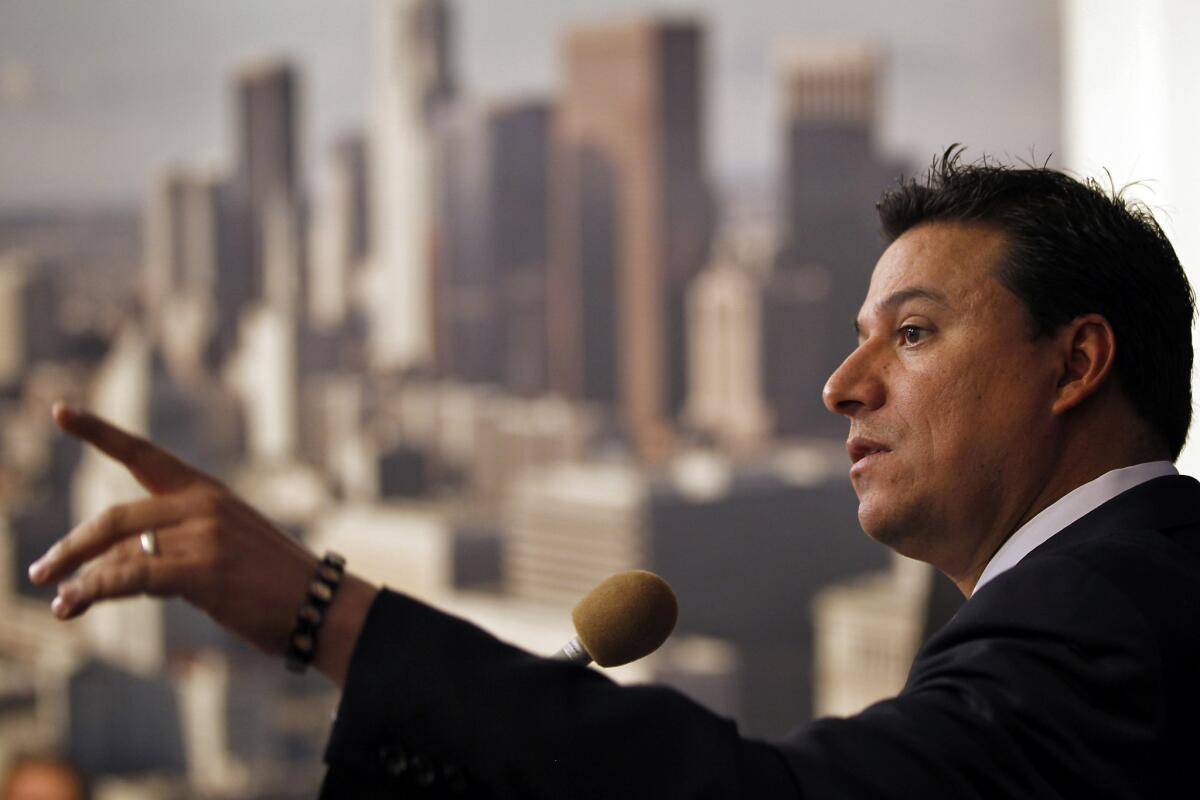Editorial: To end City Hall corruption, get politicians out of land-use decisions

In the days after Los Angeles City Councilman Jose Huizar was arrested on a slew of corruption charges for allegedly heading a vast pay-to-play scheme, his City Hall colleagues expressed the outrage one would expect.
They said they were devastated, appalled and angry at how Huizar allegedly used his position to rake in $1.5 million in cash and other benefits from real estate developers looking to build in L.A. Since the arrest, the City Council has voted to suspend Huizar, and Controller Ron Galperin announced he would halt Huizar’s paycheck.
What now? It would be a grievous mistake for city leaders to think they’ve solved the corruption problem by kicking Huizar off the council and cutting off his paycheck. The behavior laid out in the federal indictment may be sordid and unscrupulous, but it stems directly from the city’s land-use and development process, which gives council members enormous power over real estate decisions — and without checks over how they wield that authority.
Just look at some of the details in the indictment. Huizar was given carte blanche by his fellow council members to overrule the Planning Commission and loosen affordable-housing requirements in a swanky new high-rise in the Arts District. Prosecutors say Huizar made the changes after the developer offered to contribute $50,000 to support his wife’s council campaign.
As chairman of the council’s powerful Planning and Land Use Management Committee, Huizar was able to exert significant control over development throughout the city. His staff compiled lists of pending projects so he could hit up the developers for campaign contributions. As one unnamed former city official was recorded telling a Chinese developer in 2018, if Huizar does not put a project on the committee’s agenda, it “will not see the light of day for a long time.”
When an official holds that kind of concentrated power — over decisions that can cost developers and companies millions of dollars — it just invites corruption.
Even before the Huizar investigation, there were plenty of concerns about soft corruption. The unwritten understanding is that City Council districts are like fiefdoms, over which council members have sole discretion to make real estate development decisions, including whether a project gets an exemption from zoning and land-use rules, or whether it should be granted a tax break.
By the way, it should be noted that Huizar didn’t do just the bidding of deep-pocketed developers. To appease the owner of a shopping center and a few NIMBYs, he threw up hurdle after hurdle to block a project in Boyle Heights to house the homeless, even though the project had widespread community support. Huizar eventually relented but the needless delays cost the nonprofit developer more than two years and millions of dollars and postponed the construction of much-needed homeless housing.
And that’s the larger problem: The unchecked power over land-use decisions taints the entire land-use system in Los Angeles. As long as the rules are mere suggestions and every approval is negotiable, council members can speed approvals or stall projects, with little accountability.
In the wake of the corruption scandal, Councilman David Ryu, who has been the most outspoken advocate for campaign finance and development reform, has proposed barring council members from overriding Planning Commission decisions. He also wants to create an inspector-general-like position to oversee land-use, development and construction decisions in the city. Councilman Paul Krekorian said he wants the city to consider banning developers from operating in the city if they get caught bribing a city official.
Those are interesting ideas worth exploring. But they only scratch the surface.
Los Angeles needs to fundamentally alter how developments are approved. The city needs clear, modern and objective rules for development that spell out what can be built where. The rules should represent the needs of the city for housing and jobs, as well as the neighborhood’s desires for amenities and livability. Those rules should guide project approvals. The city cannot continue to tolerate case-by-case development based on the whims of a councilman, a political contribution or a NIMBY opponent.
For decades, elected officials in L.A. have been unwilling to reform the development system. Perhaps it will take a corruption scandal of historic proportions to force them to bring sanity and clarity to development.
More to Read
A cure for the common opinion
Get thought-provoking perspectives with our weekly newsletter.
You may occasionally receive promotional content from the Los Angeles Times.






